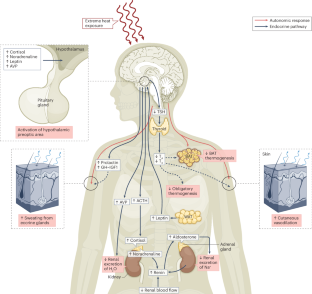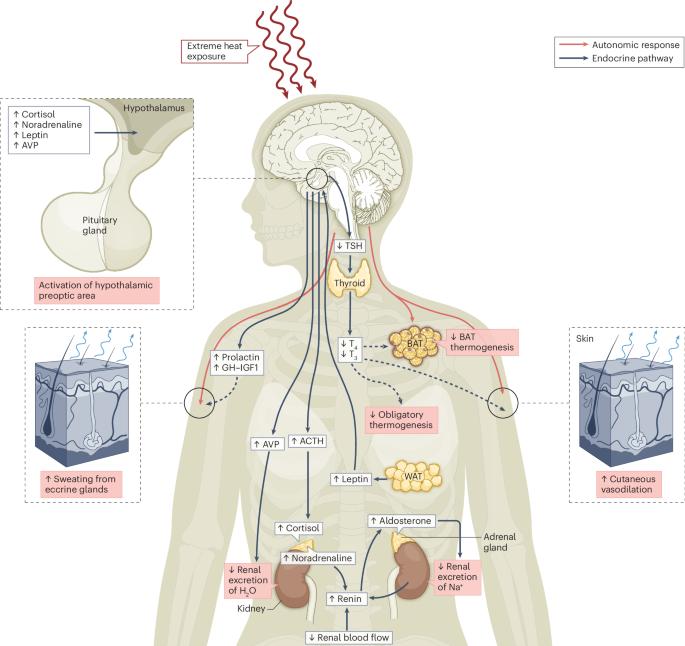Endocrine effects of heat exposure and relevance to climate change
IF 31
1区 医学
Q1 ENDOCRINOLOGY & METABOLISM
引用次数: 0
Abstract
Climate change is increasing both seasonal temperatures and the frequency and severity of heat extremes. As the endocrine system facilitates physiological adaptations to temperature changes, diseases with an endocrinological basis have the potential to affect thermoregulation and increase the risk of heat injury. The effect of climate change and associated high temperature exposure on endocrine axis development and function, and on the prevalence and severity of diseases associated with hormone deficiency or excess, is unclear. This Perspective summarizes current knowledge relating to the hormonal effects of heat exposure in species ranging from rodents to humans. We also describe the potential effect of high temperature exposures on patients with endocrine diseases. Finally, we highlight the need for more basic science, clinical and epidemiological research into the effects of heat on endocrine function and health; this research could enable the development of interventions for people most at risk, in the context of rising environmental temperatures. Climate change is causing human populations to be exposed to increasingly higher ambient temperatures and more frequent and extreme heatwaves than previously observed. This Perspective considers the available evidence on the endocrine effects of heat exposure, and maps out a path for future research into this field.


高温对内分泌的影响以及与气候变化的关系
气候变化正在增加季节性气温以及极端高温的频率和严重程度。由于内分泌系统促进对温度变化的生理适应,具有内分泌基础的疾病有可能影响体温调节并增加热伤害的风险。气候变化和相关高温暴露对内分泌轴发育和功能的影响,以及对与激素缺乏或过剩有关的疾病的发病率和严重程度的影响尚不清楚。本视角总结了从啮齿动物到人类等不同物种中有关高温暴露对荷尔蒙影响的现有知识。我们还描述了高温暴露对内分泌疾病患者的潜在影响。最后,我们强调有必要就高温对内分泌功能和健康的影响开展更多的基础科学、临床和流行病学研究;在环境温度不断升高的背景下,这项研究可以为风险最高的人群制定干预措施。
本文章由计算机程序翻译,如有差异,请以英文原文为准。
求助全文
约1分钟内获得全文
求助全文
来源期刊

Nature Reviews Endocrinology
医学-内分泌学与代谢
CiteScore
42.00
自引率
0.70%
发文量
158
审稿时长
6-12 weeks
期刊介绍:
Nature Reviews Endocrinology aspires to be the foremost platform for reviews and commentaries catering to the scientific communities it serves. The journal aims to publish articles characterized by authority, accessibility, and clarity, enhanced with easily understandable figures, tables, and other visual aids. The goal is to offer an unparalleled service to authors, referees, and readers, striving to maximize the usefulness and impact of each article. Nature Reviews Endocrinology publishes Research Highlights, Comments, News & Views, Reviews, Consensus Statements, and Perspectives relevant to researchers and clinicians in the fields of endocrinology and metabolism. Its broad scope ensures that the work it publishes reaches the widest possible audience.
 求助内容:
求助内容: 应助结果提醒方式:
应助结果提醒方式:


